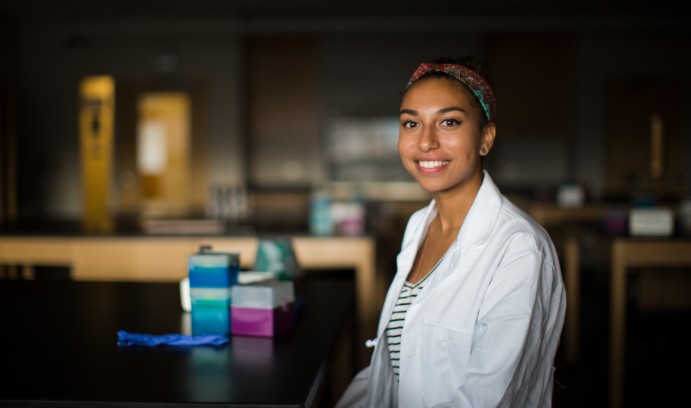When Destiny West ’20 first arrived at Lehigh University as a participant in the Rapidly Accelerated Research Experience (RARE) program as well as pre-health advising, she didn’t know what field of research she wanted to pursue during her studies at Lehigh.
Although she didn’t expect to participate in multiple biological research projects throughout college, West started to fall in love with the work, she says, because she likes to take on the challenge of doing something different from her intended career in medicine.
West, a double major in biology and health, medicine and society, worked on a biology project last summer, conducting research on an anemone called Nematostella vectensis in a joint project under Santiago Herrera, assistant professor of biological sciences, and the Layden Lab.
To help fund this research project, West applied for and received the Grant for Experiential Learning in Health, which she used to travel to Auburn University in Alabama for a training workshop and to conduct research on Nematostella vectensis at Lehigh. Students eligible for the grant include those with sophomore standing and a GPA of at least 2.0 interested in an activity related to health, such as research that will occur in the summer.
West used the grant to further research in DNA methylation, which looks at methylation regions throughout the genome, and its role in regeneration. She and her team decided to study Nematostella vectensis because of its regenerative properties.
“Regeneration is an extremely important topic within the field of biomedical research today because understanding its intricacies will enable researchers to expedite the regeneration of tissues and organs, reducing complications and rejections,” West says.
The research team needed the grant because obtaining DNA sequencing data is expensive, even just for a couple of sets, West explains.
She says the computer databases allow them to compress their data and then choose what to do with it depending on their research. West’s research team used the data to do a lot of sequence alignments. West says they compare the alignments to the sequenced genome of the Nematostella vectensis.
Although the work is different from what she expected she would do to prepare for a future career, West says she is always happy to do something different because it is a good learning experience.
Herrera was West’s mentor for applying for the grant. West has worked with Herrera, postdoctoral research associate Matt Galaska and other undergraduates since summer 2017 on another research project that analyzes deepwater coral samples from the Gulf of Mexico.
“She is an outstanding student and has great promise not only in academics but [in] research in the lab,” Herrera says. “I’m happy having her work in my group.”
Galaska says West has produced great work in the lab and is happy she was awarded the grant.
“I believe that she deserves it because she’s highly motivated, intelligent, has great work ethic and she’s just a pleasure to be around,” Galaska says. “She has an upbeat attitude even with all the long hours we put in for this work.”
At Auburn University, West participated in the annual bioinformatics boot camp. There she learned techniques used to analyze data, which she says was one of her favorite grant-related activities.
“I took a lot more away from the bioinformatics work because it is really difficult, but I think it would be really relevant to being a doctor,” West says. “So later in life I will probably have to use some bioinformatics depending on what kind of job I have.”
She says she enjoyed working with people from all different schools and of various academic standing including graduate students, postdoctoral students and professors.
Herrera says that the training experience was helpful for West, enabling her to contribute to the Nematostella project with the new skills that she acquired.
Although the grant was only used in the summer, West is continuing Nematostella research along with the team. They will collect more samples to conduct more statistical analysis, redo extractions and continue sequencing.
West is also in the early stages of her own project, in which she will analyze samples of Alaskan Paragorgia, another type of coral.
Outside of conducting research, West is a TRAC fellow, captain of the running club team, a member of the LU Indian Students Association and treasurer of the improv club.
Story by Madison Hoff ’19





